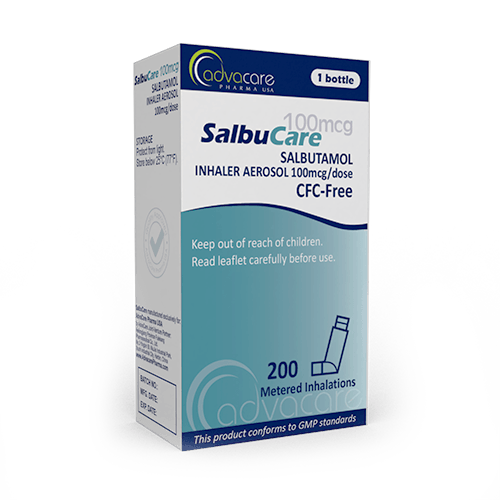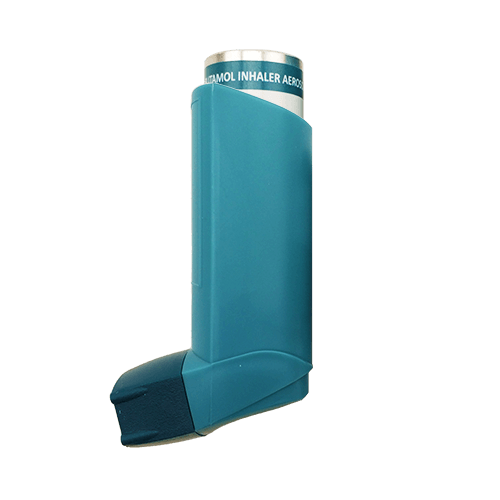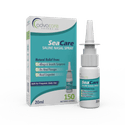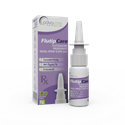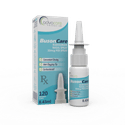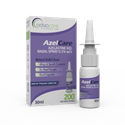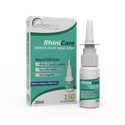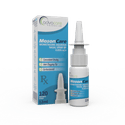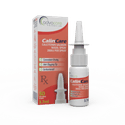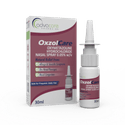- Home›
- Pharmaceuticals›
- Nasal Sprays›
- Albuterol Inhaler Aerosol
Albuterol Inhaler Aerosol
Dosage
Packaging
What is Albuterol Sulfate (Salbutamol) Inhaler Aerosol?
Active Ingredients: Salbutamol (Albuterol Sulfate)
Albuterol Inhaler Aerosol is a quick-acting drug used to treat wheezing, difficulty breathing, and chest tightness associated with asthma or other lung diseases, like bronchitis and chronic obstructive pulmonary disease (COPD). It is also used to treat or prevent exercise-induced bronchospasm.
Albuterol Inhaler Aerosol is recommended for adults and children over the age of 4. It typically begins to work within 15 minutes of administration and is effective for 2-6 hours afterward. This medication is on the World Health Organization's List of Essential Medicines. It is one of the most commonly prescribed medications in the world.
Albuterol is also known by the name of salbutamol. It is classified as a selective beta2-adrenergic receptor agonist. It works as a bronchodilator by relaxing the muscles of the airways into the lungs. This increases airflow to the lungs, which makes it easier for a patient to breathe.
AdvaCare Pharma is a trusted global exporter of Salbutamol (Albuterol Sulfate) Inhaler Aerosol. This medication is produced in our facilities in China, India, and the USA. Our manufacturing facilities are GMP certified and are regularly inspected in order to ensure they meet health, safety, and environmental standards.
Why choose us as your Albuterol Inhaler manufacturer?
AdvaCare Pharma, an American pharmaceutical company, manufactures Albuterol Inhaler at our GMP-certified facilities. We are committed to manufacturing more than 500 cost-effective, high-quality medicines that meet the highest industry standards and are readily available to patients worldwide. As an experienced Albuterol Inhaler manufacturer, our global reach extends to over 65 markets where we supply a comprehensive range of 15+ nasal sprays to pharmaceutical distributors, pharmacies, hospitals and government institutions.
Uses
What is Albuterol (Salbutamol) used for?
It is used to treat or prevent bronchospasm associated with reversible obstructive airway diseases. It is also used to prevent exercise-induced bronchospasm.
Is Albuterol Inhaler Aerosol an over-the-counter medication?
Whether an Albuterol Inhaler Aerosol is an over-the-counter medication or not is dependent on regional regulations. In some countries, this medicine still requires a prescription; however, it is available without a prescription at drugstores and supermarkets in many other countries. It is advised to check local government regulations to determine whether Albuterol Inhaler Aerosol can be sold or purchased as an OTC medication.
How is an Albuterol Inhaler Aerosol used?
This drug has been manufactured as a solution which is contained in an aerosol bottle intended for oral administration.
If the inhalation device is dropped or has not been used in 2 or more weeks, spray 3-4 times away into the air, away from the face. Shake well between each spray.
What dose should be given?
Dosing is represented in puffs or actuations. 1 actuation is equal to 108 mcg albuterol sulfate equivalent to 90mcg albuterol base (NEB).
Adult Dosing Dosage may vary based on different medical indications:
- To treat or prevent bronchospasm, the usual dose is 2 puffs/inhalations every 4-6 hours as needed. Alternatively, some patients may respond to 1 inhalation every 4 hours, as needed.
- For acute bronchospasm (mild-moderate exacerbation), the usual dose is 4-8 puffs/inhalations taken every 20 minutes for up to 4 hours. Then 4-8 puffs/inhalations every 1-4 hours as needed.
- For acute bronchospasm (severe exacerbation), the usual dose is 4-12 puffs/inhalations taken every 20 minutes for up to 4 hours. Then 4-12 puffs/inhalations every 1-4 hours as needed.
- To prevent exercise-induced bronchospasm, the usual dose is 2 inhalations taken 5-30 minutes before exercising.
Renal and hepatic dosing are not defined for this medication. Caution is advised for high-dose treatment in patients with renal impairment.
Pediatric Dosing For bronchospasm, the usual dose is as follows:
- children over 4 years old: 2 puffs given every 4-6 hours as needed. Alternatively, 1 puff can be inhaled every 4 hours as needed.
- children under 4 years old: 2 puffs given every 4-6 hours as needed. Alternatively, 1 puff can be inhaled every 4 hours as needed.
When determining dosage using the albuterol base, the usual dosing is as follows:
- children over 5 years old: 1.25-5mg NEB given every 4-6 hours as needed.
- children between 2-4 years old: 0.63-2.5mg NEB given every 4-6 hours as needed.
- children under 2 years old: 0.63-2.5mg NEB, given every 4-6 hours as needed.
For acute bronchospasm (mild-moderate exacerbation), the usual dose is as follows:
- adolescents and children over 12 years old: 4-8 puffs taken every 20 minutes for 3 times. Then 4-8 puffs are taken every 1-4 hours as needed.
- children younger than 12 years old: 4-8 puffs taken every 20 minutes for 3 times. Then 4-8 puffs are taken every 1-4 hours as needed.
When determining dosage using the albuterol base, the usual dosing is as follows:
- adolescents and children over 12 years old: 2.5-5mg NEB, given every 20 minutes for 3 times. Then 2.5-10mg NEB is inhaled every 1-4 hours as needed.
- children between 2-11 years old: 0.15mg/kg per dose, with a minimum of 2.5mg NEB. Actuations should be given every 20 minutes for 1 hour (3 times). Then 2.5-10mg NEB is inhaled every 1-4 hours as needed.
- children younger than 2 years old: 0.15mg/kg per dose, with a minimum of 2.5mg NEB. Actuations should be given every 20 minutes for 1 hour (3 times). Then 2.5-10mg NEB is inhaled every 1-4 hours as needed.
For acute bronchospasm (severe exacerbation), the usual dose is as follows:
- adolescents and children over 12 years old: 4-12 puffs taken every 20 minutes for 3 times. Then 4-12 puffs are taken every 1-4 hours as needed.
- children from 1-11 years old: 4-8 puffs taken every 20 minutes for 3 times. Then 4-8 puffs are taken every 1-4 hours as needed.
When determining dosage using the albuterol base, the usual dosing is as follows:
- adolescents and children over 12 years old: 5mg NEB, inhaled every 20 minutes for 3 times. Then 10mg NEB is inhaled every 1-4 hours as needed.
- children between 2-11 years old: 0.15mg/kg per dose, with a minimum of 2.5mg NEB. Actuations should be given every 20 minutes for 1 hour (3 times). Then 2.5-10mg NEB is given every 1-4 hours as needed.
- children less than 2 years old: 0.15mg/kg per dose, with a minimum of 2.5mg NEB. Actuations should be given every 20 minutes for 1 hour (3 times). Then 2.5-10mg NEB is given every 1-4 hours as needed.
To prevent exercise-induced bronchospasm, the usual dose is as follows: • children over 4 years old: 2 puffs inhaled 5-30 minutes before exercising. • children younger than 4 years old: 1-2 puffs inhaled 5-30 minutes before exercising.
Refer to a doctor or pharmacist for guidelines on dosage.
Who can use Albuterol?
Albuterol Inhaler Aerosols can be used by adults and children, but caution is advised for specific groups of patients.
Pregnant Albuterol is considered the preferred drug for asthma treatment during pregnancy. Though it is unknown whether albuterol may cause infant harm, it is known that uncontrolled asthma increases the risk of eclampsia, premature birth, and low birth weight. The benefits must be weighed against the risk when given during labor or delivery, as there is a risk of uterine contractility interference due to the mechanism of action.
Breastfeeding This medication is considered safe for use by breastfeeding women.
Though no human data is available, the risk of infant harm is not expected.
Children Albuterol inhaler is considered safe for use in pediatric populations. It is recommended to use a face mask for children under 4 years old.
Geriatric Data is not available for specific age-related effects in older patients. It is important to note that elderly patients with asthma are more likely to die from asthma-related symptoms than other demographics.
Other warnings
Inhaled albuterol may exacerbate heart failure when patients also exhibit reduced ejection fraction.
Side Effects
As with all pharmaceuticals, some unwanted effects can occur from the use of Albuterol Sulfate (Salbutamol) Inhaler Aerosol.
Common side effects include, but may not be limited to:
- feeling shaky
- headache
- irregular heartbeat
- muscle cramps
- flushing
- mouth irritation
Seek medical attention if the following develop:
- signs of an allergic reaction
- paradoxical bronchospasm
Do not exceed recommended dose. Excessive usage of this product may be fatal.
For a comprehensive understanding of all potential side effects, consult a medical professional.
If any symptoms persist or worsen, or any new symptoms appear, please call your doctor.
Precautions
Do NOT use Salbutamol (Albuterol Sulfate) Inhaler Aerosol if:
- You are allergic to any of the ingredients.
- You have severe hypersensitivity to milk proteins.
- You are taking beta-blockers such as propranolol.
- You have threatened abortion during the first six months of pregnancy.
Before treatment, consult your doctor regarding any medications you are taking to address potential drug interactions.Some known interactions include beta-blockers, diuretics, digoxin, MAO inhibitors, and tricyclic antidepressants.
It is important to note that Salbutamol is not a replacement for corticosteroid treatment.
This medication may not be suitable for people with certain conditions, so it is important to consult with a doctor if you have any health conditions, including:
- heart conditions
- hypokalemia (low levels of potassium in the blood)
- diabetes or other blood sugar issues
- thyroid disorders
- hypertension
- a history of seizures
Some types of inhalers may use hydrofluoroalkane (HFA) as a propellant rather than chlorofluorocarbons (CFCs). These devices are the same besides this exception.
An increased need for doses may be a sign of the deterioration of the disease. Reevaluation of treatment may be necessary.
Excessive usage of this medication may cause serious adverse effects, including fatality.
References
Effect of salbutamol on nasal symptoms and mast cell degranulation induced by adenosine 5′ monophosphate nasal challenge
Salbutamol has protective effects by inhibiting mast cell activation, due to the agonistic action on β2 adrenergic receptors in airway smooth muscle cells. The main objective of this study is to provide the first evidence in vivo of inhibition of human mast cell activation by salbutamol.
This is a double-blind crossover study, that included 9 atopic subjects who received either a placebo or salbutamol (5mg/mL) 15 minutes before undergoing an adenosine 5′ monophosphate (AMP) nasal provocation. Nasal lavage samples were collected from these patients before and at 3, 5, 15, and 30 minutes after the AMP challenge. During the study, the concentrations of histamine and tryptase in the nasal lavage were measured.
AMP nasal provocation caused sneezing and a transient increase in histamine and tryptase release, with a peak only 3 minutes after the provocation in placebo patients. Patients who received salbutamol significantly reduced the AMP-induced release of histamine and tryptase (P=0.048 and 0.020, respectively) and also salbutamol pre-treatment significantly inhibited AMP-induced sneezing (P=0.004).
The conclusion of this study is that intranasal salbutamol reduces nasal symptoms and inhibits histamine and tryptase release following AMP nasal provocation. This shows that salbutamol provides protective effects in the airways by inhibiting mast cell activation.
You might be interested in...
Why AdvaCare Pharma?
As an industry leader, we are aware of our responsibility to provide affordable and sustainable solutions to improve healthcare worldwide.
